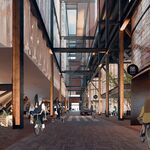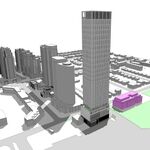afransen
Senior Member
Great response.I really don't understand why you are so annoyed when someone running multiple businesses is trying to expand/promote those businesses. That's literally what capitalism is and how capitalism works. If you don't like that then you can move to North Korea, or maybe Antarctica.
And really, doing things in the frame in an auto-centric city is basically just doing things in the frame of what exists in North America. It's not the job of private corporations to fix urban sprawl. That's the government's job. A couple of zoning changes and we'd already be halfway there. If anything, maybe you should be screaming at Walmart and Home Depot, whose impacts to cities have been far worse. But even then, they just took advantage of the opportunities created by the government in the form of zoning laws and highway infrastructure etc. When there is an opportunity in a market economy, someone will take advantage of it. That's the government's problem, not Walmart and Home Depot's problem.
And if you say we should "ignore what Elon Musk says and look at what he does", then let's take a look, what has he done?
- Started electronic banking via (the precursor of) PayPal
- Made electric vehicles a thing. Nobody cared or talked about EVs before Tesla existed and the entire auto industry was staunchly against electrification. There is no question that Tesla has dramatically accelerated the transition to EVs. If you do not recognize that EVs are far better for the environment, society, and cities compared to ICE vehicles then we have really lost hope.
- Making 100% renewable energy grids feasible via grid scale energy storage systems
- Dramatically lowered the cost of accessing space. Allows economically feasible fast satellite internet for the 50% of people on Earth not currently connected to the Internet, allows more science to be done in space, etc.
- And, the funniest thing about this statement that you've made, The Boring Company is still super early stage and basically hasn't done anything yet. If we "ignore what Elon Musk says" and just "look at what he does" with regards to the Boring Company, the only thing that has happened is the construction of a test tunnel in LA and a people mover-type system, so basically no material impact on cities. OK pedantry aside, this is literally a private company attempting to lower the cost of building tunnels. That in of itself will benefit public transportation putting pressure on the industry to also lower costs, and I think we can all agree that cheaper tunnels = better.
And to answer this: "If Elon Musk created something like the Loop system, where mass transit could go point to point underground. (Ignoring all the safety issues and logistics and cost), why would you even consider transporting cars??????"
Well, if you have excess capacity after fulfilling public transit needs on the Loop system, and you're a private company looking to maximize usage and revenue of your infrastructure, why wouldn't you allow cars? There will almost certainly be excess capacity, since Loop is basically just a one-lane underground highway with self-driving EVs only, and on the highway, headways are like 2 seconds. If you think safety, logistics, and cost are issues, so what? This is a private company. If the cost balloons, that's their problem. If the logistics make it super difficult to build or operate, that's also their problem. If the cars keep crashing, they'll be liable (which is why they'll use self driving only, which will make it much safer than the highway).
Musk definitely is a little too fond of cars, in my opinion, but that is the norm for people in North America.
It is really amusing to see how Musk draws out the irrational hatred in some and the ludicrous boosterism in others. I think it would be fantastic for cities if Musk develops a way to profitably move people around cities underground using electric power. The surface can increasingly be dedicated to people, instead of vehicles. And any such solution would tend to be quite competitive with mass public transit in certain applications, providing much better service for similar actual cost (including subsidy). I don't see why we should doom the poor to 90 minute bus rides because we hate smaller vehicles.




